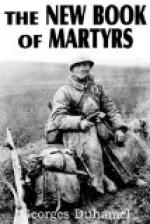When the pressure was greatest, it was impossible to undress the men and get them washed properly before bringing them into the operating-ward. The problem was in these cases to isolate the work of the knife as far as possible from the surrounding mud, dirt and vermin: I have seen soldiers so covered with lice that the different parts of the dressings were invaded by them, and even the wounds. The poor creatures apologised, as if they were in some way to blame....
At such moments patients succeeded each other so rapidly that we knew nothing of them beyond their wounds: the man was carried away, still plunged in sleep; we had made all the necessary decisions for him without having heard his voice or considered his face.
We avoided overcrowding by at once evacuating all those on whom we had operated as soon as they were no longer in danger of complications. We loaded them up on the ambulances which followed one upon the other before the door. Some of the patients came back a few minutes later, riddled with fragments of shell; the driver had not succeeded in dodging the shells, and he was often wounded himself. In like manner the stretcher-bearers as they passed along the road were often hit themselves, and were brought in on their own hand-carts.
One evening there was a “gas warning.” Some gusts of wind arrived, bearing along an acrid odour. All the wounded were given masks and spectacles as a precaution. We hung them even on the heads of the beds where dying men lay ... and then we waited. Happily, the wave spent itself before it reached us.
A wounded man was brought in that evening with several injuries caused by a gas-shell. His eyes had quite disappeared under his swollen lids. His clothing was so impregnated with the poison that we all began to cough and weep, and a penetrating odour of garlic and citric acid hung about the ward for some time.
Many things we had perforce to leave to chance, and I thought, during this alarm, of men just operated on, and plunged in the stupor of the chloroform, whom we should have to allow to wake, and then mask them immediately, or ...
Ah, well! ... in the midst of all this unimaginable tragedy, laughter was not quite quenched. This phenomenon is perhaps one of the characteristics, one of the greatnesses of our race—and in a more general way, no doubt, it is an imperative need of humanity at large.
Certain of the wounded took a pride in cracking jokes, and they did so in words to which circumstances lent a poignant picturesqueness. These jests drew a laugh from us which was often closely akin to tears.
One morning, in the sorting room, I noticed a big, curly-haired fellow who had lost a foot, and had all sorts of wounds and fractures in both legs. All these had been hastily bound up, clothing and all, in the hollow of the stretcher, which was stiff with blood. When I called the stretcher-bearers and contemplated this picture, the big man raised himself on his elbow and said:




